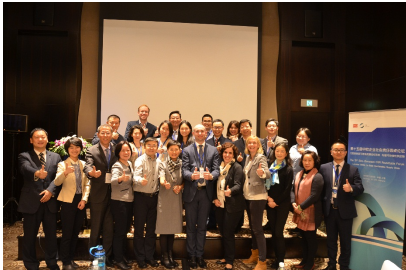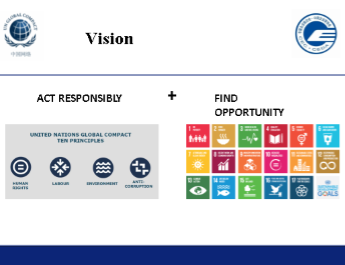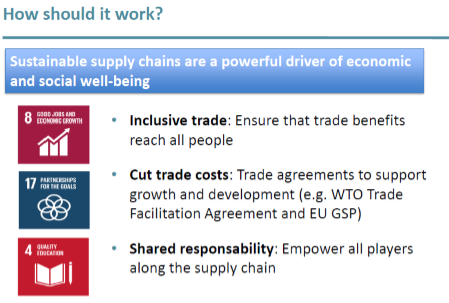SDGs connects enterprises with sustainable future
2017-01-05GoldenBeeadmin0010

On November, 30, the 15th Sino-European CSR Roundtable Forum, jointly hosted by China WTO Tribune and Foreign Trade Association (FTA) and supported by China National Textile and Apparel Council was held in Shanghai. This event brought together a large number of attendees – featuring sustainability experts, representatives from the Chinese government, CSR organizations, NGOs, business associations and academia – to explore the potential advantages and implications of fulfilling the SDGs adopted under the United Nations 2030 Agenda for Sustainable Development.
Under the theme ‘Localize Sustainable Development Goals (SDGs) to Build a Sustainable Supply Chain’, the roundtable explored and addressed how to localize and implement SDGs to promote the building of a sustainable supply chain, and translate this into feasible plans for the challenging global market. It also provided enterprises with ideas on how to integrate SDGs into business management and the entire value chain. Initiated by the United Nations, SDGs are the new international guidelines for global sustainable development, bringing new opportunities for the advancement of sustainable global supply chains.
In his welcoming remarks, Mr. Christian Ewert, Director-General, Foreign Trade Association (FTA), said, “As the leading business association promoting the values of sustainable trade, FTA is committed to define its long-term strategy and to measure its contribution to the SDGs defined under the United Nations framework. Decent Work and Economic Growth, Quality Education and environmentally-focused goals, being key to our members, will be core elements in defining our vision and operations in the years to come. In this journey, China, as the key sourcing country for FTA member companies, will certainly be a critical partner in jointly pursuing these goals and we are very pleased to see the country proactively identifying SDGs in a local business context. Through our FTA Vision 2030 strategy and joint collaborations with Members and multi-stakeholders, our ultimate goal is to enable our Members to demonstrate how they as businesses are contributing towards to the SDGs”
Mr. Zhang Yanming, Standing Deputy Director, Corporate Social Responsibility Office of Shanghai Pudong New Area, shared practice of government in Pudong New Area on how to promote CSR over the past decades.
In his speech, Mr. Zhang mentioned that Pudong New Area is an headquarter of economic highland with strong international competiveness, and the business operations within it not only influence the regional economic and social environment, but also impact the world through supply chain.
According to the development needs of Shanghai Free Trade Zone, the Corporate Social Responsibility Office of Pudong New Area associates with various organizations to promote the government -oriented, sector-propelled, enterprise-implemented, and society-involved mode for promoting the normalization of sustainable consumption and production model. This coincide with what No.12 goal of SDGs advocates.
Mr. Zhang points out Pudong New Area also compared its local standard with the National Social Responsibility Standard after it was released in 2015, and updated the evaluation system to expect more enterprises can follow the latest CSR trend and direction and implement more leading and in-depth practices in sustainablility, which will empower more vigorous, standardized and orderly enterprises , and contribute to the successful localization of SDGs.
Mr. Han Bin, Executive Secretary-general, Global Compact Network China adapted reliable data to illustrate the deployment and localization of SDGs in China. He said that the SDGs shows us the 17preferential fields in future sustainable development. United Nations Global Compact encourages enterprises to catch the opportunities offered by the 17 goals of SDGs with responsible actions.
Under the theme ‘Localize Sustainable Development Goals (SDGs) to Build a Sustainable Supply Chain’, the roundtable explored and addressed how to localize and implement SDGs to promote the building of a sustainable supply chain, and translate this into feasible plans for the challenging global market. It also provided enterprises with ideas on how to integrate SDGs into business management and the entire value chain. Initiated by the United Nations, SDGs are the new international guidelines for global sustainable development, bringing new opportunities for the advancement of sustainable global supply chains.
In his welcoming remarks, Mr. Christian Ewert, Director-General, Foreign Trade Association (FTA), said, “As the leading business association promoting the values of sustainable trade, FTA is committed to define its long-term strategy and to measure its contribution to the SDGs defined under the United Nations framework. Decent Work and Economic Growth, Quality Education and environmentally-focused goals, being key to our members, will be core elements in defining our vision and operations in the years to come. In this journey, China, as the key sourcing country for FTA member companies, will certainly be a critical partner in jointly pursuing these goals and we are very pleased to see the country proactively identifying SDGs in a local business context. Through our FTA Vision 2030 strategy and joint collaborations with Members and multi-stakeholders, our ultimate goal is to enable our Members to demonstrate how they as businesses are contributing towards to the SDGs”
Mr. Zhang Yanming, Standing Deputy Director, Corporate Social Responsibility Office of Shanghai Pudong New Area, shared practice of government in Pudong New Area on how to promote CSR over the past decades.
In his speech, Mr. Zhang mentioned that Pudong New Area is an headquarter of economic highland with strong international competiveness, and the business operations within it not only influence the regional economic and social environment, but also impact the world through supply chain.
According to the development needs of Shanghai Free Trade Zone, the Corporate Social Responsibility Office of Pudong New Area associates with various organizations to promote the government -oriented, sector-propelled, enterprise-implemented, and society-involved mode for promoting the normalization of sustainable consumption and production model. This coincide with what No.12 goal of SDGs advocates.
Mr. Zhang points out Pudong New Area also compared its local standard with the National Social Responsibility Standard after it was released in 2015, and updated the evaluation system to expect more enterprises can follow the latest CSR trend and direction and implement more leading and in-depth practices in sustainablility, which will empower more vigorous, standardized and orderly enterprises , and contribute to the successful localization of SDGs.
Mr. Han Bin, Executive Secretary-general, Global Compact Network China adapted reliable data to illustrate the deployment and localization of SDGs in China. He said that the SDGs shows us the 17preferential fields in future sustainable development. United Nations Global Compact encourages enterprises to catch the opportunities offered by the 17 goals of SDGs with responsible actions.

Mr. Han explained how to localize SDGs for enterprises: the first step is to confirm the priority matters which means to define the impacted areas; secondly, to set goals and integrate sustainability into all departments, and then to cooperate with stakeholders. The last step is to communication, reporting to stakeholders on enterprise’s main contributions to sustainable development.
Dr. Ioana Kraft, General Manager, European Union Chamber of Commerce in China (European Chamber) shared what European Chamber did to help European enterprises to realize responsible and sustainable development over the past decade; meanwhile, she introduced the vision of European Chamber to achieve SDGs.
She said that European Chamber hope to synchronize existing member efforts in sustainability with SDGs. The European Chamber CSR White Paper published earlier this year concludes excellent efforts made by its member companies and elaborates their sustainability progress in diverse areas, including green supply chain, CSR in crisis management, children’s right. European Chamber will further synchronize the existing European Chamber’s efforts in matching their business sustainability with SDGs and also to inspire more enterprises to follow this trend, integrate SDGs with five development concepts proposed by Chinese government.
Dr. Liang Xiaohui, Chief Researcher, Office for Social Responsibility, China National Textile and Apparel Council (CNTAC), UN SDG Pioneer clarified the background, significance and relation between enterprises and SDGs with six English letters “ABC and XYZ”.
Dr. Ioana Kraft, General Manager, European Union Chamber of Commerce in China (European Chamber) shared what European Chamber did to help European enterprises to realize responsible and sustainable development over the past decade; meanwhile, she introduced the vision of European Chamber to achieve SDGs.
She said that European Chamber hope to synchronize existing member efforts in sustainability with SDGs. The European Chamber CSR White Paper published earlier this year concludes excellent efforts made by its member companies and elaborates their sustainability progress in diverse areas, including green supply chain, CSR in crisis management, children’s right. European Chamber will further synchronize the existing European Chamber’s efforts in matching their business sustainability with SDGs and also to inspire more enterprises to follow this trend, integrate SDGs with five development concepts proposed by Chinese government.
Dr. Liang Xiaohui, Chief Researcher, Office for Social Responsibility, China National Textile and Apparel Council (CNTAC), UN SDG Pioneer clarified the background, significance and relation between enterprises and SDGs with six English letters “ABC and XYZ”.

Mr. Liang said A means the SDGs is an Action-oriented plan, B indicates SDGs is full of Business opportunity, C means SDGs is the Common goal for everyone, and XYZ matches three Chinese words’ first letter respectively stands for action (Xing), actualization (Yan) and understanding (Zhi).
Dr. Will Shen, Secretary-General, Zhejiang Province CSR Association shared the working progress and efforts of Zhejiang Province towards CSR from the perspective of industrial association, and also introduced the joint project of China WTO Tribune , Zhejiang CSR Promotion Association and FTA. this project builds solid foundation for achieving SDGs in this region.
Dr. Pierre Gröning, Head of International Trade Policy, FTA, proposed that sustainable supply chain is a powerful driver of economic and social wellbeing from the perspective of sustainable trade. He said that inclusive trade can ensure the trade to benefit all the people in society; shared responsibility empowers enterprises promote high quality education. Enterprises should take multiple responsibilities, and actively formulate policies. Meanwhile they should have courage to challenge government, and promote government to pursue SDGs, becoming the leading promoter.

Ms. Fu Ting, Assistant Director of CSR Division, State Grid Corporation of China (State Grid), shared her views based on the energy enterprise’s practice. She noted that the development issue is the energy and environmental problems. Starting with the green clean energy, she combined the SDGs with the green transformation of State Grid by explaining the green development strategy and responsible procurement.
During Breakout Sessions, all participants have an intensive discussion regarding to how to promote the integration of SDGs into corporate practice through technology upgrading and innovation and what measures can be taken to realize the fair employment of the youth and the disabled, and proposed some practical suggestions.
During Breakout Sessions, all participants have an intensive discussion regarding to how to promote the integration of SDGs into corporate practice through technology upgrading and innovation and what measures can be taken to realize the fair employment of the youth and the disabled, and proposed some practical suggestions.

Mr. Yu Zhihong, President and Editor-in-chief, China WTO Tribune was invited to moderate this forum and gave a final summary:
Firstly, SDGs is a global consensus among governments and industrial and commercial circles around the world and is the trend and direction of global development. It means the transformation from pressure to driving force for the industrial and commercial circles.
Secondly, SDGs brings great development opportunity and space for enterprises and strengths the social value of enterprises. The process to achieve SDGs is also a process for constantly innovation and development.
Thirdly, the cooperation and coordination among stakeholders is needed to achieve SDGs.
Fourthly, the large-size enterprises, while presenting the model role, should help and guide those small and medium size enterprises on supply chain, and work together to pursue SDGs, by which to demonstrate the significance of building sustainable supply chain.
Firstly, SDGs is a global consensus among governments and industrial and commercial circles around the world and is the trend and direction of global development. It means the transformation from pressure to driving force for the industrial and commercial circles.
Secondly, SDGs brings great development opportunity and space for enterprises and strengths the social value of enterprises. The process to achieve SDGs is also a process for constantly innovation and development.
Thirdly, the cooperation and coordination among stakeholders is needed to achieve SDGs.
Fourthly, the large-size enterprises, while presenting the model role, should help and guide those small and medium size enterprises on supply chain, and work together to pursue SDGs, by which to demonstrate the significance of building sustainable supply chain.
Best Practices
- The 100-year brand — Air Liquide also has a sense of juvenile
- Beijing Public Transportation Corporation: Developing green transportation to build a harmonious and livable capital
- CGN: Building a modern factory in barren deserts and developing a new win-win cooperation model along “Belt and Road”
Upcoming Event

All the materials on the site “Source: XXX (not from this site)” have been reprinted from other media. They do not imply the agreement by the site.
All the materials with “Source: CSR-China Website” are the copyright of CSR-China Website. None of them may be used in any form or by any means without permission from CSR-China Website.
GoldenBee Official WeChat
Copyright © Csr-china.net All Right Reserved.
京ICP备19010813号










